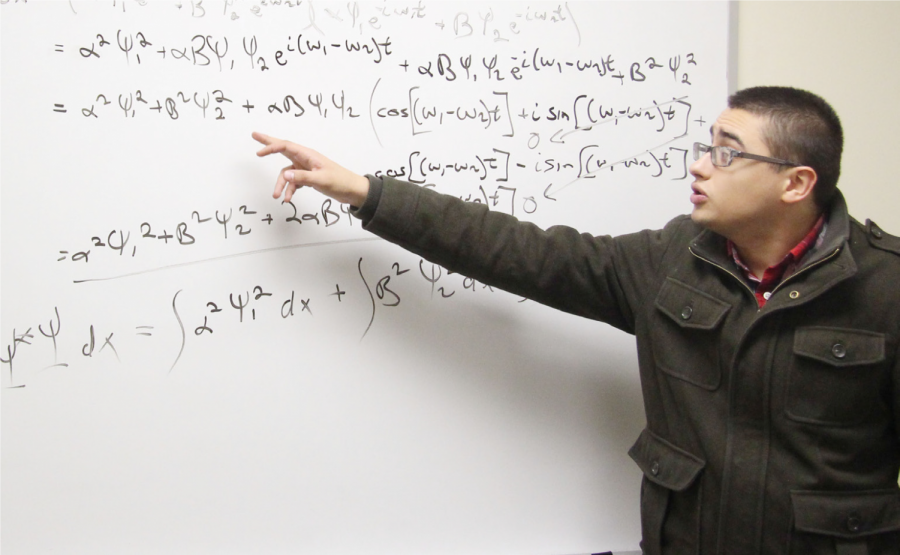Physics major earns national fellowship
Student earns award over 600 applicants
Justin Malave, senior physics major at Baldwin Wallace, has recently received the Victor Blanco Undergraduate Research Fellowship award. This award is given to motivated physics students who have plans to attend graduate school and participate in the Society for Advancement of Chicanos/Hispanics and Native Americans in Science (SACAS) conference in Salt Lake City. The Victor Blanco Fellowship provided Malave the necessary funding to go to this conference.
Despite Malave’s tremendous work, he did not expect to receive an award of such a high degree.
“Three people got it: little ol’ me here at BW, some girl at Columbia University, and a guy at California Tech,” said Malave, “I was quite surprised to be stacked up with two of the best physics institutions in the United States. It was quite nice.”
Malave received the national award for his research on antielectron neutrinos at Vanderbilt University. Vanderbilt only has ten spots available for undergraduate research and Malave was one of the few who earned a spot.
“I sent in an application, and there was no application fee, thankfully,” said Malave. “and I wrote a personal statement. I wrote the personal statement in a single night. It wasn’t due anytime soon, but I wrote it in a matter of three hours and I decided to send it off with my application and I was lucky enough to be selected. It was my second time applying. I applied my first year as a physics major and was rejected…they do receive a lot of applications every year. I believe this year they received a total of 600 applications. I was able to snag a spot, and I like to believe that was because of my personal statement. I put a lot of thought into it, despite writing it in three hours, and I had a lot of classes under my belt and more research experience.”
Malave believes he could not have done it alone, and credits his teachers for his confidence.
Malave said, “I had the pleasure to meet Dr. Melissa Dennison. She taught me everything I know about pre-calculus. It was my performance in that class, and the way I interacted with other students in that class, that pushed me into reading more physics and science related books. Then I started reading and reading and reading. By the end of it I thought, maybe I could do this … What kept me there was my first calculus course with Dr. Aaron Montgomery, my calculus II and III courses with Dr. Brent Strunk, and the challenging, but fun, classes in the physics department I took with Dr. Edwin Meyer and Professor Meredith Witt. I went in there with some confidence in my mathematical abilities, but it was calculus I and the beginner physics classes that really reinvigorated me…they make the stuff fun. While I was in high school, I didn’t have fun with it. I’m not sure if that was me or the teacher. I just felt like I was regurgitating information; however, I came here and took the classes. I had fun and they challenged me. They never made me feel like I couldn’t do it. There was never a moment where I felt that I didn’t belong. When I asked questions, nobody seemed annoyed. They seemed like they really wanted to help me out, to bring me up to speed with the best student or even them. They saw that I enjoyed what I was doing. It was something I came to appreciate.”
Malave went on to talk about his experience presenting his research at the SACNAS conference.
“When I go on to present my research, my words don’t come out in this Faulknerian manner,” Malave said, “I speak with more excitement. I presented in front of motivated students, scholars from other universities, researchers from national labs, CEOs and presidents from organizations, big time people were making their way to my poster to listen to me. I was able to explain things confidently in front of some top-of-the-line scientists. I was also able to present in front of students from DePaul. I presented in front of a lot of intelligent and motivated people, and I look forward to doing that again.”
Malave’s studies in physics will continue into graduate school, but the branch of physics will depend on what school he attends. After college is done, Malave plans on researching further and becoming a teacher.
“I’d like to become a professor or go on to do research, or both,” said Malave, “If I can do one… or both, I’ll be pretty happy. It’s a win-win situation for me. If I do both, I’ll have no free time whatsoever; however, I will likely be happy. My free time, anyway, is spent on physics. I want to do what I do. Taking a break sometimes frustrates me.”
The Exponent is looking for financial contributions to support our staff and our newsroom in producing high-quality, well-reported and accurate journalism. Thank you for taking the time to consider supporting our student journalists.











































